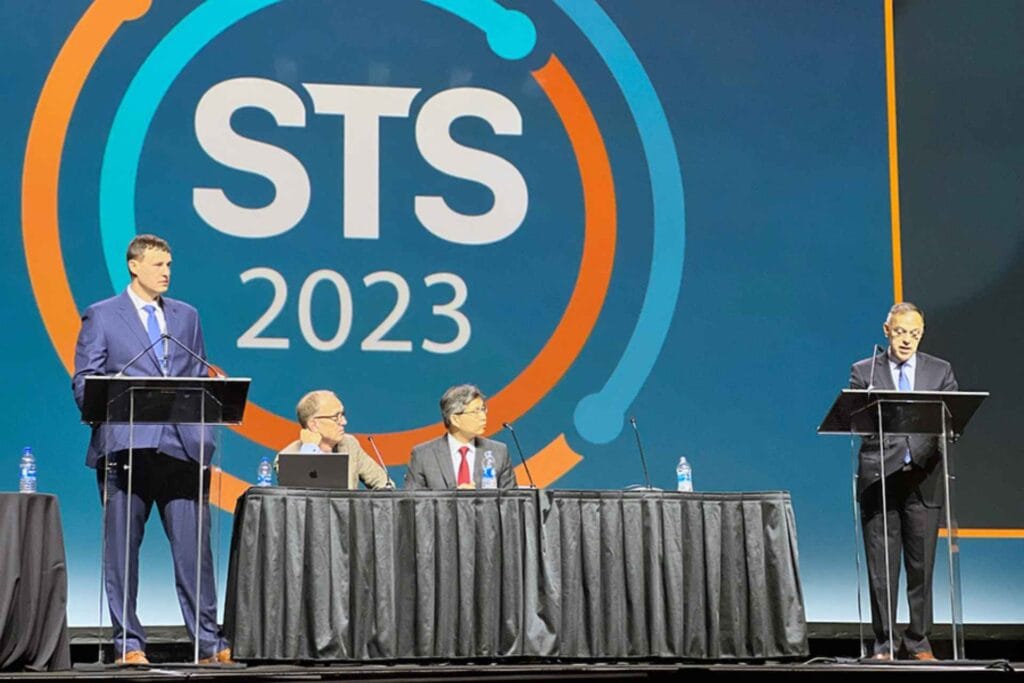MORGANTOWN, W.Va. – WVU Heart and Vascular Institute clinical researchers presented results of a national study highlighting the benefits of coronary artery bypass graft surgery over the use of stenting in specific patients with coronary artery disease and blockages in multiple arteries.
The team of cardiologists and surgeons from the WVU Heart and Vascular Institute was represented by J. Hunter Mehaffey, M.D., assistant professor and co-director of research in the Division of Cardiac Surgery, as he presented the findings as the top paper at the annual meeting of the Society of Thoracic Surgeons in San Diego on Jan. 22.
There are three major coronary arteries that provide blood to the heart muscle, and blockages in the arteries can lead to heart attacks or death. Stenting is an excellent option for some patients with blockages, particularly to rescue those from an acute heart attack or in stable conditions where the blockage occurs in a focal area and a limited number of arteries. Similarly, surgery to bypass the blockages may be better for those with several blockages or when other conditions, such as diabetes, may exist.
“Recently, controversy was created when the American College of Cardiology and American Heart Association published recommendations that were not endorsed by many professional societies that said that bypass surgery may not be as important for patients with stable multivessel coronary artery disease,” Dr. Mehaffey explained.
“These recommendations were based largely on a single study that looked at invasive versus conservative treatment of patients with stable multivessel disease, but it was not powered to effectively detect the impact of surgery or stenting on survival. Unfortunately, the overinterpretation of these findings has resulted in confusion among doctors and patients on how best to address blockages in multiple vessels, especially when presenting to the hospital with symptoms. Furthermore, this confusion may put some patients at risk of not accessing the best treatment.”
To help provide much needed clarity, WVU Heart and Vascular Institute researchers conducted an analysis of all patients in the U.S. over the age of 65 hospitalized with symptoms of multivessel coronary artery disease using the Centers for Medicare and Medicaid Services database. The study included more than 100,000 patients undergoing either coronary artery bypass graft surgery or stenting between 2018 and 2020. Robust statistical methodology to ensure a comparison between well balanced groups was used to properly examine three-year outcomes.
“The results of our study demonstrated that compared to stenting, patients who underwent bypass surgery had a slightly higher complication risk initially, but by 30-days after discharge, bypass surgery resulted in lower complication rates of heart attack, heart failure, kidney failure, and readmission,” Mehaffey said. “Most importantly, by three years after the procedure, there was a marked improvement in survival of bypass surgery over stenting, with a 60 percent reduction in death.”
“At the WVU Heart and Vascular Institute, we strive not only to fulfill our mission of providing the most advanced and evidence-based care to all patients we serve, but to also deliver innovations through novel therapy and research,” J.W. Awori Hayanga, M.D., M.P.H., professor, co-director of research, and co-author of the study, said.
“The current comparative effectiveness research is another example of how our renowned faculty of cardiologists and surgeons are ensuring that all patients receive the best treatment to improve the quantity and quality of their lives,” noted Vinay Badhwar, M.D., executive chair of the WVU Heart and Vascular Institute and senior author of the new study. “By providing new evidence, our team can help doctors and patients not just in West Virginia, but across our nation and the world.”
For more information about treatment of coronary artery disease or any of the cardiac specialties at the WVU Heart and Vascular Institute, visit WVUMedicine.org/Heart.













